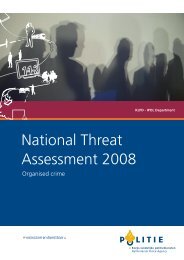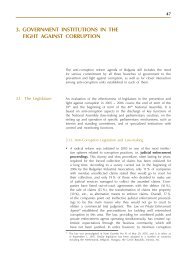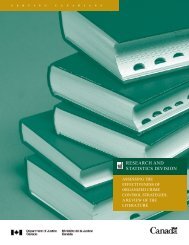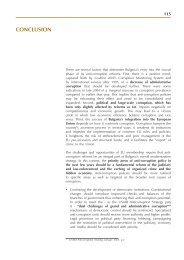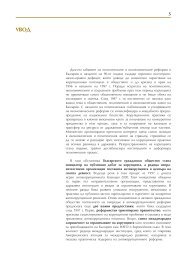5. Civil Society against Corruption (PDF, 293 kb)
5. Civil Society against Corruption (PDF, 293 kb)
5. Civil Society against Corruption (PDF, 293 kb)
You also want an ePaper? Increase the reach of your titles
YUMPU automatically turns print PDFs into web optimized ePapers that Google loves.
CIVIL SOCIETY AGAINST CORRUPTION 107<br />
This has hampered both the effectiveness of NGOs and the credit they<br />
take for their effort.<br />
Public-private partnership at the local level also faced certain problems.<br />
Many pre-election commitments of the local authorities to participate in<br />
joint anti-corruption initiatives with the civic sector were not met at all<br />
or failed to lead to the creation of permanent mechanisms of publicprivate<br />
partnership or to any tangible anti-corruption results.<br />
Despite these challenges public-private partnerships have become<br />
the most effective mechanism through which anti-corruption reforms<br />
were implemented.<br />
These partnerships have come in numerous forms. NGO experts have<br />
played important role in the discussion and assessment of draft anticorruption<br />
legislation. A case in point is the elaboration by Coalition<br />
2000 of the draft ombudsman law, its cooperation with the Customs<br />
Agency and the Ministry of Interior in identifying measures <strong>against</strong><br />
smuggling and related corruption, as well as with the Ministry of Labor<br />
and Social Policy and the Ministry of the Economy in developing<br />
extensive measures to restrict unregistered employment and reduce the<br />
regulatory burden of the state.<br />
Monitoring the integrity of public services of high corruption risk<br />
is another area where Coalition 2000 and a number of watchdog<br />
organizations have been active. NGOs have received and investigated<br />
reported cases of corruption and, in partnership with state institutions<br />
and the media, helped put in place the conditions for improved public<br />
accountability and transparency and for curbing corrupt practices at the<br />
various levels of government. A local level anti-corruption network was<br />
also established on the initiative of Coalition 2000 in partnership with<br />
non-governmental organizations to monitor corruption risk zones in the<br />
municipal administration.<br />
<strong>Civil</strong> society organizations outside the capital city Sofia are increasingly<br />
active. This is crucial as policies undertaken by the government need to<br />
be supplemented local level effort engaging citizens and thus ensuring<br />
that policies keep their relevance and government receives feedback.<br />
For example, since 1997 Coalition 2000 and other NGOs have initiated<br />
the establishment of local institutions of the ombudsman type (public<br />
mediators). Even before an adequate legal framework was put in place,<br />
similar institutions were set up in a number of municipalities (Sofia,<br />
Veliko Turnovo, Razgrad, Zavet, and others) and started operating upon<br />
the initiative of civil society in cooperation with the local authorities.<br />
It should also be noted that non-governmental organizations themselves<br />
continue to be vulnerable to corruption. Enhanced accountability is<br />
needed for two main reasons: the majority of NGO funding in Bulgaria<br />
comes from foreign public sources; there could be justified public<br />
mistrust of those non-governmental organizations which thrive on political<br />
protection and privileges.



